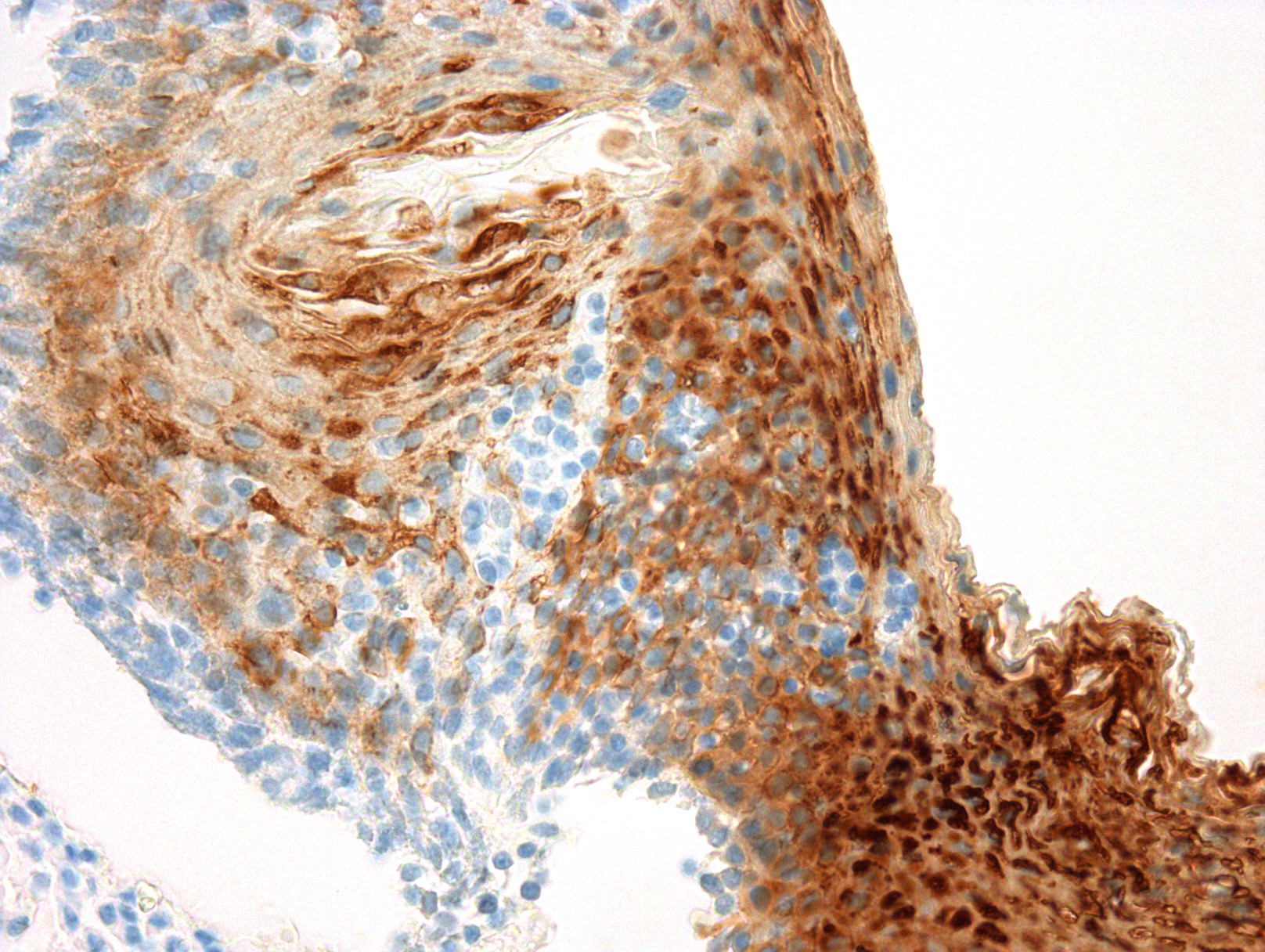Antibody (Suitable for clinical applications)
| Specification | Recommendation |
|---|---|
| Recommended Dilution (Conc) | 1:25-1:100 |
| Pretreatment | Citrate Buffer pH 6.0 |
| Incubation Parameters | 30 min at Room Temperature |
Prior to use, inspect vial for the presence of any precipitate or other unusual physical properties. These can indicate that the antibody has degraded and is no longer suitable for patient samples. Please run positive and negative controls simultaneously with all patient samples to account and control for errors in laboratory procedure. Use of methods or materials not recommended by enQuire Bio including change to dilution range and detection system should be routinely validated by the user.
Cytokeratin 13 Information for Pathologists
Summary:
Molecular weight is 53 kDa. Pairs with CK4. Marker of mature but non-keratinized squamous epithelium. Downregulated in squamous cell carcinoma of head and neck (Oral Oncol 2005;41:183) and other sites (Virchows Arch A Pathol Anat Histopathol 1991;418:249). Sensitive marker for retinoid bioactivity in skin warts of renal transplant recipients (Arch Dermatol 2002;138:61).
Common Uses By Pathologists:
No significant clinical use by pathologists. Positive staining – normal Suprabasal layers of non-cornified stratified epithelium, including squamous (non-keratinized) epithelia of cervix, esophagus, larynx, oral cavity, tonsils, urothelium, and respiratory-type epithelium. May be filled with mucoid material or foamy macrophages. Positive staining – disease
| Cytokeratin 13 General Information | |
|---|---|
| Alternate Names | |
| Molecular Weight | |
| 49.6 kDa | |
| Chromosomal Location | |
| q21.2 [chr: 17] [chr_start: 41500981] [chr_end: 41505705] [strand: -1] | |
| Curated Database and Bioinformatic Data | |
| Gene Symbol | KRT13 |
| Entrez Gene ID | 3860 |
| RefSeq Protein Accession(s) | NP_705694; NP_002265 |
| RefSeq mRNA Accession(s) | NM_002274; NM_153490; |
| RefSeq Genomic Accession(s) | NG_008406; NC_000017 |
| UniProt ID(s) | P13646 |
| PharmGKB ID(s) | PA30202 |
| KEGG Gene ID(s) | hsa:3860 |
| Associated Diseases (KEGG IDs) | White sponge nevus 2 (WSN2) [MIM:615785]: A rare disorder characterized by the presence of soft, white, and spongy plaques in the oral mucosa. The characteristic histopathologic features are epithelial thickening, parakeratosis, and vacuolization of the suprabasal layer of oral epithelial keratinocytes. Less frequently the mucous membranes of the nose, esophagus, genitalia and rectum are involved. {ECO:0000269|PubMed:10561721, ECO:0000269|PubMed:11379896, ECO:0000269|PubMed:14600690, ECO:0000269|PubMed:7493031}. The disease is caused by mutations affecting the gene represented in this entry. |
| General Description of Cytokeratin 13 . | |
| This antibody is specific to 54 kDa protein. Cytokeratin 13 belongs to the type A (acidic) subfamily of low molecular weight cytokeratins and exists in combination with cytokeratin 4. Cytokeratin 13 is expressed in squamous, non-keratinized epithelium, transitional epithelium and myoepithelium. This antibody is useful for the identification of carcinomas of trachea, sweat glands, bladder, ectocervix, tongue, esophagus, anal canal and the basal layer of keratinized epidermis. | |




There are no reviews yet.